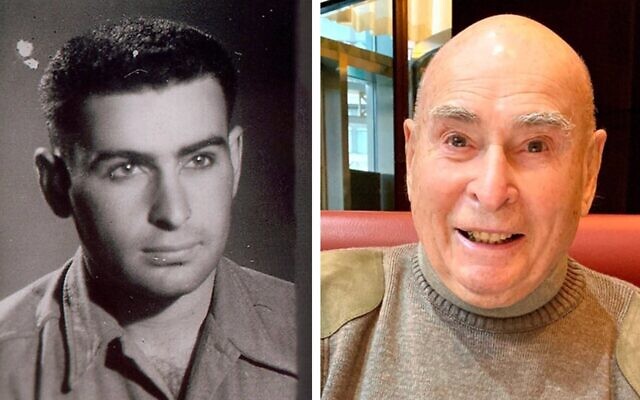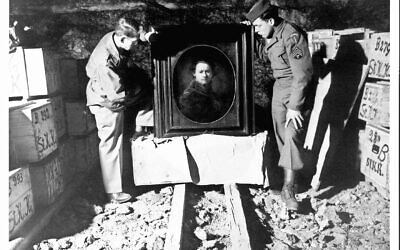Richard Barancik, last of the ‘Monuments Men’ who recovered art and treasure looted by the Nazis, dies at 98
Richard and a fellow soldier assisted in moving stolen art treasures to the central repository of the U.S. Property Control Branch and served as guards.

Richard Barancik, the last surviving member of the Allied military corps that hunted down and recovered countless artworks stolen by the Nazis, died July 14 in Chicago. He was 98.
As an Army private first class and member of what was officially known as the Monuments, Fine Arts, and Archives (MFAA) Section, and unofficially known as the “Monuments Men” (although it included a few women), Barancik was dispatched to Salzburg, Austria in 1945.
He and a fellow soldier assisted in moving stolen art treasures to the central repository of the U.S. Property Control Branch and served as guards.
Although he would go on to become a prolific architect after the war, the 20-year-old Barancik volunteered for the MFAA only with training in basic engineering and a love of art.
“When I arrived in Salzburg, I was not only overwhelmed by the beauty of the town but the quality of the men in the Fine Arts Section. They were typically older and very well educated in the fine arts,” he said in an interview last year.

All told, about 350 men and women, mostly academics, art historians and other antiquities experts, served in the MFAA, mostly from the United States and Great Britain but nearly a dozen other countries as well.
Between 1943 and its dissolution in 1946, the Monuments Men recovered thousands of paintings, sculptures, gold and other cultural objects in both Europe and Asia — a rescue effort that allowed Jewish survivors, the families of victims and others who had been stripped of their assets by the Nazis to recover many of them in the decades after the war.
After the war but while still serving in the military, Barancik attended Cambridge University in England and the Ecole des Beaux-Arts at Fontainebleau, France. He returned home to finish his architecture degree at the University of Illinois.
The firm he founded in 1950 with a former instructor, Barancik Conte & Associates, designed private homes, office buildings, campuses and bowling alleys, and eventually became known for distinctive high-rises along Chicago’s upscale “Gold Coast.”
He retired in 1993 and split his time between Pebble Beach, California, and Chicago. He served on the boards of the Latin School of Chicago, the San Francisco Asian Art Museum, the Monterey Institute of International Studies and the Monterey Museum of Art.
In 1995, Barancik was part of a delegation of former Monuments Men who traveled to Washington, D.C., to receive the nation’s highest civilian honor, the Congressional Gold Medal.
“This is a small group of people who, acting purely on their passion and courage, reclaimed the world’s most valuable treasures,” Rep. John Boehner, then Speaker of the House, said at the ceremony. “They reattached the tendons to the bone that is a civilisation’s identity.”
Barancik was born in Chicago in 1924. His mother, Carrie Grawoig, was an immigrant from Russia who gave piano lessons; his father, Dr. Henry Barancik, ran a hospital division in France during World War I and was chief of staff at Jackson Park Hospital and South Chicago Hospital, according to the Chicago Sun-Times.
Barancik is survived by two sons, three daughters, four grandchildren and three great-grandchildren. He was divorced once and widowed twice.
“Richard was larger than life, a true original who defied convention,” his family remembered in a tribute. “He had an impeccable eye for art and design, no matter if it was high or low. He knew what he loved… and surrounded himself with those things, whether they were paintings, ship models or miniatures.”

Thank you for helping to make Jewish News the leading source of news and opinion for the UK Jewish community. Today we're asking for your invaluable help to continue putting our community first in everything we do.
For as little as £5 a month you can help sustain the vital work we do in celebrating and standing up for Jewish life in Britain.
Jewish News holds our community together and keeps us connected. Like a synagogue, it’s where people turn to feel part of something bigger. It also proudly shows the rest of Britain the vibrancy and rich culture of modern Jewish life.
You can make a quick and easy one-off or monthly contribution of £5, £10, £20 or any other sum you’re comfortable with.
100% of your donation will help us continue celebrating our community, in all its dynamic diversity...
Engaging
Being a community platform means so much more than producing a newspaper and website. One of our proudest roles is media partnering with our invaluable charities to amplify the outstanding work they do to help us all.
Celebrating
There’s no shortage of oys in the world but Jewish News takes every opportunity to celebrate the joys too, through projects like Night of Heroes, 40 Under 40 and other compelling countdowns that make the community kvell with pride.
Pioneering
In the first collaboration between media outlets from different faiths, Jewish News worked with British Muslim TV and Church Times to produce a list of young activists leading the way on interfaith understanding.
Campaigning
Royal Mail issued a stamp honouring Holocaust hero Sir Nicholas Winton after a Jewish News campaign attracted more than 100,000 backers. Jewish Newsalso produces special editions of the paper highlighting pressing issues including mental health and Holocaust remembrance.
Easy access
In an age when news is readily accessible, Jewish News provides high-quality content free online and offline, removing any financial barriers to connecting people.
Voice of our community to wider society
The Jewish News team regularly appears on TV, radio and on the pages of the national press to comment on stories about the Jewish community. Easy access to the paper on the streets of London also means Jewish News provides an invaluable window into the community for the country at large.
We hope you agree all this is worth preserving.





















